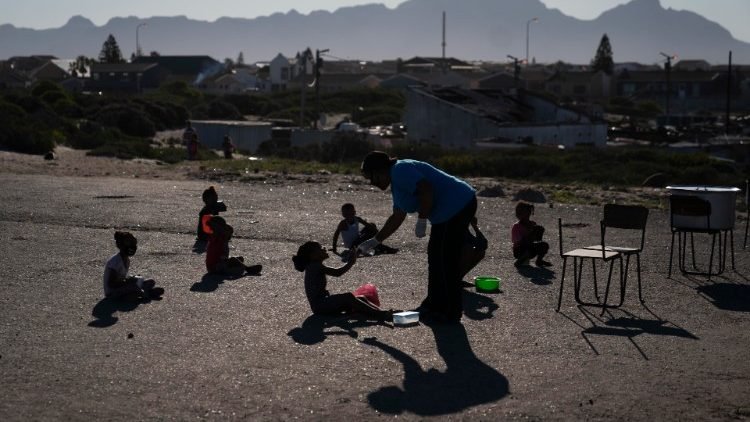George Thuku, the AMECEA Safeguarding Officer, has reiterated the importance of paying attention to the safety of children during the coronavirus pandemic
In the face of the ongoing coronavirus pandemic and the subsequent preventative measures that governments and Church authorities are taking, children are vulnerable to other forms of abuse. As such, children must remain at the centre of everyday life, work and focus to ensure their emotional, physical, social, economic, and spiritual wellbeing.
English Africa Service – Vatican City
“We are saddened by the increasing fatalities across the world, notably affecting the elderly but also children. Our deepest condolences to all those mourning the loss of loved ones and to all of us affected in one way or another. We pray that the Lord will bring an end to the human suffering occasioned by the virus,” said Mr George Thuku, the AMECEA Safeguarding Officer based in Nairobi, Kenya.
What is AMECEA?
The Association of Member Episcopal Conferences in Eastern Africa (AMECEA) is a regional body of all Bishops in the Eastern Africa region.
AMECEA, established in 1961, comprises member episcopal conferences of Ethiopia, Eritrea, Kenya, Uganda, Sudan, South Sudan, Malawi, Tanzania, and Zambia. Somalia and Djibouti have associate member status.
Children are psychologically affected by COVID-19.
Even though the mortality rate, due to COVID-19, remains relatively low, children continue to feel the impact of the pandemic in various ways.
Schools play a critical role in a child’s life. Most schools have had to be closed to prevent the spread of the virus among children, and this disrupts not just schooling but the normal psychosocial and spiritual life of a child.
According to Thuku, children also get emotionally affected when parents, caregivers or family members become ill. It is vital to bear in mind the vulnerability of children and be extra vigilant to safeguard them from possible harm.
To help parents, guardians and Church institutions, Thuku outlined a set of practical approaches that can easily be applied for the benefit of children.
Speak openly to children
“First, with extended time together, parents can help (children) process the psychosocial meaning of the pandemic. They ought to actively engage with them by asking open-ended questions, correct myths they may have, address any fears by assuring them of their parental protection and care. However, this must be done without promising them too much as children already know some things are beyond even us as adults.”
Thuku continued, “It is also important that parents help children understand and observe the coronavirus prevention measures as advised by health workers and governments. They ought to understand the fact that they are equally vulnerable to the coronavirus infection and that they can also infect others,” he emphasised.
The risk of abuse for children is higher
The AMECEA Safeguarding Officer further said pandemics such as COVID-19 increase the risk of abuse faced by children due to a disruption in the normal functioning of the family and community.
Children “become more vulnerable to not just the infection but to other forms of physical, emotional, sexual, neglect and even spiritual harm. Therefore, parents, guardians and caregivers must be extra cautious to always ensure that their children are supervised and well-protected whether at home or in the neighbourhood,” Thuku said.
Listen carefully to children
Parents, guardians and caregivers must make it a habit to listen to children carefully when they express or do not express their needs.
Ensure children have enough physical exercise
Children must be helped to keep physically active either by allowing them to safely play outside the house or engaging in physical exercises as is appropriate but without compromising their protection from getting infected or infecting others.
With many countries on Lockdown, children are spending extended hours at home. This poses a great risk to their physical and social wellbeing if not properly guided.
Help children with school work
“If possible, parents must encourage their children to safely access games and other resources of learning including online, (resources) about the coronavirus but also regarding their studies. Thank God, many schools were creative enough to provide for some online exercises which children can do. This will keep them safe but also mentally occupied,” Thuku explained.
Thuku also says parents and guardians should take advantage of this rare opportunity not only to spend time with their children or wards but really spend quality time with them. This is the time to ‘spoil’ children with much parental attention, care, and love, he said.



